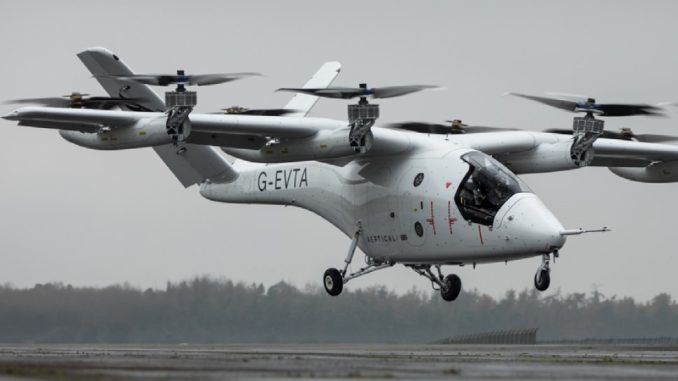
Vertical Aerospace reports its latest full scale VX4 prototype has achieved piloted, untethered vertical take-off and landing for the first time as Phase two of its flight test programme begins. Testing will now progress to low speed manoeuvres at its Flight Test Centre at Cotswolds Airport, UK, designed to assess the aircraft’s stability, battery efficiency, control characteristics, aerodynamics, structural and dynamic loads and performance across different speeds, enabling further assessment of how the VX4 behaves under real-world flight conditions.
The second of four testing phases follows the UK Civil Aviation Authority’s (CAA) expansion of Vertical’s Permit to Fly. To secure this expansion, Vertical submitted extensive documentation verifying the VX4 prototype’s safety under Phase two conditions. This included systems and structural validations, phase one outcomes, flight test protocols, engineering specifications, and detailed operational procedures. Vertical will now progress through Phase two while working with the CAA to extend its Permit to Fly and move onto Phase three – wingborne flight tests. This next stage will involve piloted take-off, flight, and landing like a conventional aircraft using wing-generated lift. The primary focus of this phase is expanding the transition envelope as safely as possible – working down in speed from high altitude rather than up in speed from low altitude, which is much safer. Phase four will involve transitioning between thrustborne and wingborne flight modes.
Vertical is currently developing an identical full-scale prototype which will accelerate the VX4’s flight test programme and demonstration capability. Once assembled, the company will take flight test learnings from both prototypes into the design and development of the certified VX4 model.
The company has also published its “Flightpath 2030” strategy outlining is schedule to move from prototype to production. By the end of the decade, Vertical is targeting: delivering at least 150 aircraft to customers; achieving an annual production rate exceeding 200 VX4 units in Q4 2030, with plans to scale up to greater than 700 units per year in the medium-term; positioning Vertical to become sustainably cash generative, achieving cash break-even in 2030; certifying the VX4 in 2028, followed by certifying its first major upgrade in 2030; and maintaining a zero accident rate, certifying to the highest level of safety – 10-9, the same as for commercial airliners.
“This update versus previous expectations follows Vertical’s positive engagement with the CAA as well as its progress, insights, and growing confidence from the second piloted flight test plan, which began in 2024 and recently advanced to Phase two” said the company in a press release.
As of September 30, 2024, the Group had £42.8 million/$ 57.4 million of cash and cash equivalents on hand, based on unaudited management accounts, said the company. “Vertical currently expects the capital required for the business to deliver its operational goals over the next 12 months to be broadly consistent with spend over the last 12 months of £78.4 million/$98.0 million. This spend will increase over time as Vertical approaches certification and then production.
“Discussions are ongoing regarding potential third party investment. Vertical is optimistic that these discussions will result in a transaction that will provide funding further into 2025 and facilitate future fundraising opportunities. In parallel Vertical continues to explore all alternative options available with respect to its funding needs.”
In 2025, Vertical plans to:
• Fly full-scale piloted transition.
• Build and fly its third full-scale VX4 prototype.
• Fly full-scale piloted flights demonstrating real-world use cases.
• Earn additional DOA privileges including Flight Conditions privilege granted by the CAA.
• Initiate production with long-range parts purchasing.
• Strengthen its operating model and shift its approach to focus on execution.
For more information
(Image: Vertical)

